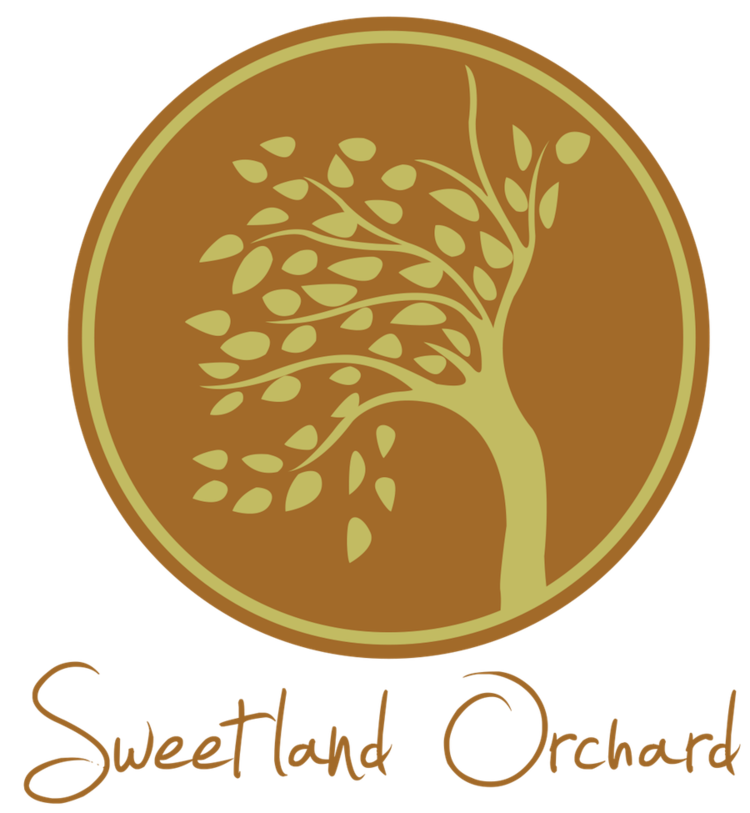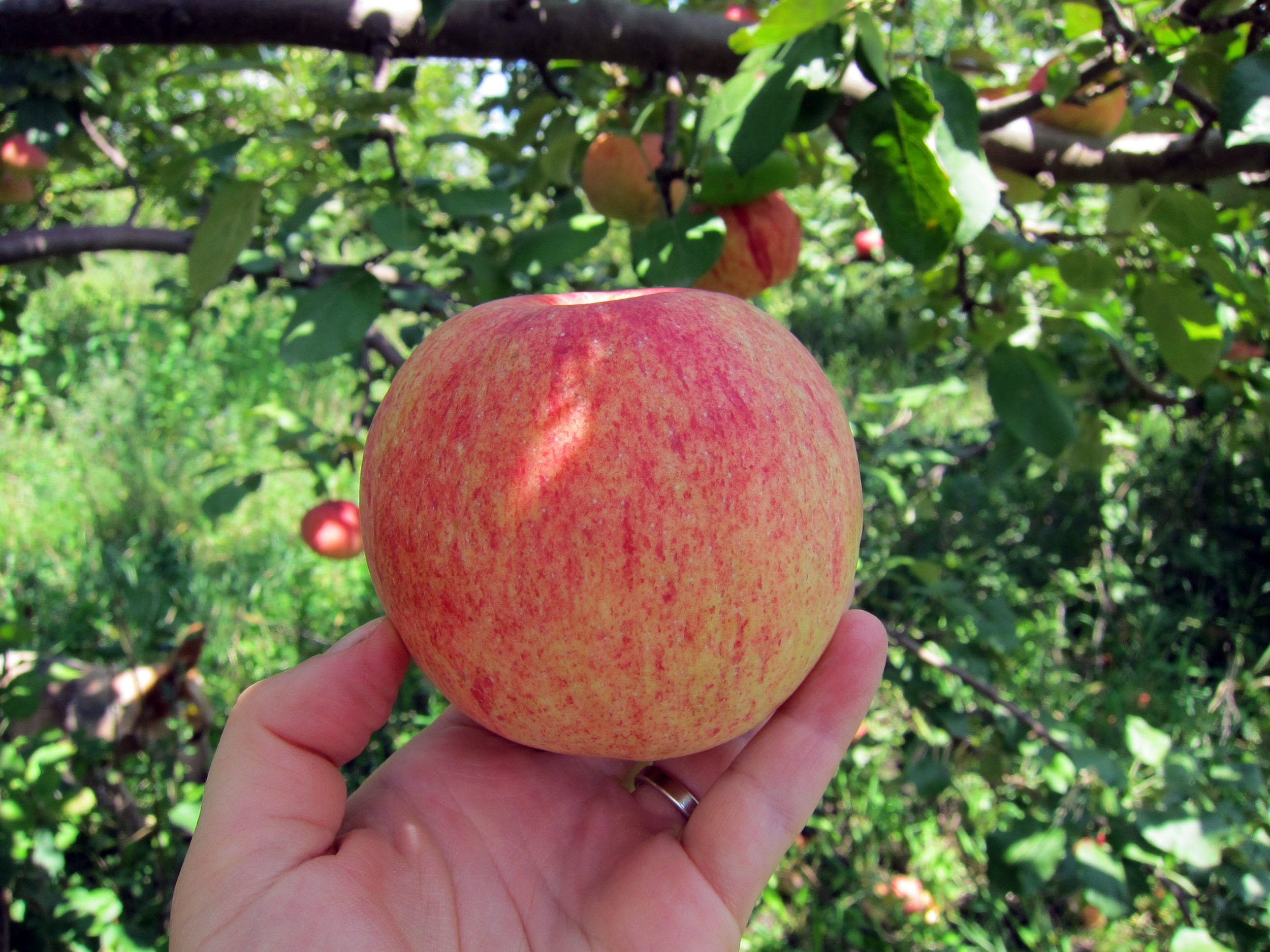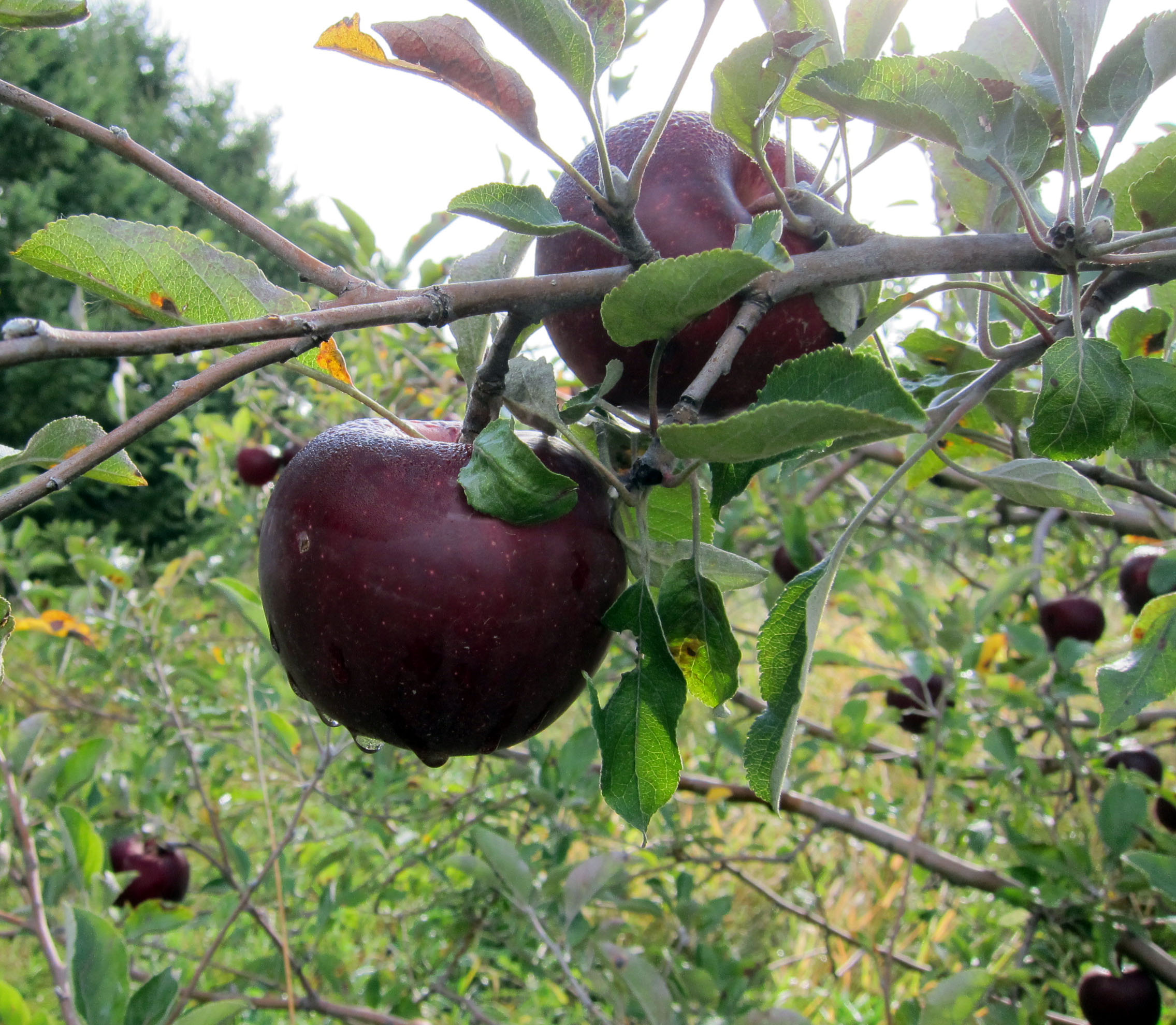Apples & Pears
We grow varieties developed by the University of Minnesota, heirloom varieties, and cider varieties; and we manage our orchard through minimal intervention.
Apple and pear varieties are organized chronologically from early season varieties to mid- and then late season varieties. To see what's currently available at the orchard, visit our Facebook page or look on Instagram.
Centennial Crab
Sweet, small, and cute. Delicious straight off of the tree, but doesn't keep for long.
Released by the University of Minnesota in 1957.
Dolgo x Wealthy
Early season
Duchess of Oldenberg
Recently discovered to be one of the grandparents of Honeycrisp. Striped, early apple. Extremely winter hardy. "Introduced into the United States from England in 1835, where it had been earlier brought from Russia in the early 1800s," "also known as ‘Borowitsky’, ‘Borovitsky’ and ‘Charlamowski’." (Howard, Nicholas P et al. “Elucidation of the ‘Honeycrisp’ Pedigree through Haplotype Analysis with a Multi-Family Integrated SNP Linkage Map and a Large Apple [Malus×domestica] Pedigree-Connected SNP Data Set.” Horticulture Research 4 [2017]: 17003–. PMC. Web. 26 Jan. 2018. available at https://www.ncbi.nlm.nih.gov/pmc/articles/PMC5321071/)
Pristine
The best early season apple we've ever experienced. Crunchy, sweet-tart, and -- believe it or not -- a decent keeper for a summer apple.
A PRI (Purdue-Rutgers-Illinois) release in 1994. Scab resistant.
Early season
Viking
Deep purple color, striking aroma. Excellent for sauce.
Developed by the PRI (Purdue-Rutgers-Illinois) apple breeding program, but never officially released. Somehow made its way to Wisconsin.
Early season
State Fair
Lovely, simple early apple, timed just right for the -- you guessed it -- Minnesota State Fair. Developed by the University of Minnesota.
SweeTango
Sweet, tart, and juicy -- with Honeycrisp's texture, this apple has it all.
Released by the University of Minnesota in 2009
Honeycrisp x Zestar!
Early season
Zestar!
Extremely sweet with a tricky texture: pick it too early and it doesn't taste as it should or pick it fully-flavored and the texture suffers.
Released by the University of Minnesota in 1999
State Fair x MN1691.
Early season
Paula Red
Lively acid. Our choice for early season caramel apples.
Discovered in Michigan, but treated like an honorary Minnesota variety.
Early season
Ginger Gold
A variety out of Virginia that seems to like our orchard's microclimate just fine.
Sweet, crunchy and pleasant, like so many yellow-skinned apple varieties.
Honeycrisp
Sweet and explosively crisp.
Released by the University of Minnesota in 1991.
Keepsake x MN1627 (Duchess of Oldenburg x Golden Delicious)
Mid season
Haralson
Minnesotans’ favorite apple before Honeycrisp came along. Tart and a bit savory.
Released by the University of Minnesota in 1922.
Malinda x Wealthy.
Mid-to-late season
Honeygold
Sweet, crunchy, and pleasant with enough acid to keep it from being boring.
Released by the University of Minnesota in 1935.
Haralson x Golden Delicious
Mid-to-late season
Cortland
A classic apple, great in nonalcoholic cider with a lovely aroma. Complex, vinous flavor with a good blend of sweet and tart. Like all McIntosh offspring, great for sauce. NY 1898. Ben Davis x McIntosh.
Ruby Jon
A sport of Jonathan, but hardier and better tasting.
Fireside/Connell Red
Lower acid and less juicy, but no less delicious. An old-fashioned favorite. Developed by the University of Minnesota.
Bonnie Best
Best for what? Best for pie! Discovered by Bonnie Keehn in the 1980’s from Cooksville, WI. Creamy flesh, tangy, full-flavored.
Golden Russet
The Golden Russet variety is highly disputed, with many varieties being called "Golden Russet" but only one that is true to the variety. Is ours one of the true Golden Russets? We may never know.
Airlie Red Flesh (formerly misidentified by us as Scarlet Surprise)
Late season red-fleshed variety. Oregon, 1960.
Prairie Spy
Notable for the density of its flesh and its pleasantly tart flavor. An excellent keeper, routinely keeping into April and May if kept in good conditions.
MN 1940.
Unknown parentage.
Northern Spy
One of our very favorite apples: excellent for fresh eating, baking, and cidermaking. A late bloomer and a late ripener.
Keepsake
A small, curious apple with yellow flesh that is purported to improve with time in storage. Keepsake is just about the latest apple we pick. A parent of Honeycrisp. Developed by the University of Minnesota in . Northern Spy x MN447 (Frostbite).
Red Free
A scab-resistant variety that's never quite made it onto our "favorites" list. Ripens so early that our customers only taste it in its liquid form.
Kingston Black
A cider variety, known as being well-suited for a single-variety cider.
Spartan
McIntosh sport
Macoun
A favorite child of McIntosh.
NW Greening
A Granny Smith for northern climes. NW Greening ripens late and is an old favorite for pie. Cooks up dry, so not a great choice for sauce, but an excellent choice for a tart. Not usually a favorite apple for eating, but a favorite in culinary uses. WI 1872. Golden Russet x Alexander.
Egremont Russet
A later season russet with the typical high acid/high sugar you expect from a russet.
Regent
Developed by the University of Minnesota
Dabinett
One of our cider varieties
Liberty
A scab-resistant variety out of New York.
Chestnut Crab
Developed by the University of Minnesota
Wealthy
Minnesota's first apple variety. Developed by Peter Gideon in Excelsior in 18xx.
Goldrush
An apple of some renown for its late-keeping abilities.





















